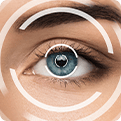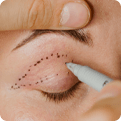
For many years, glasses and contacts were the safest and most effective way to correct your vision. But in the 20th century, multiple refractive treatments were developed and performed on patients that improved their uncorrected vision. Now, 21st-century improvements to procedures like implantable collamer lens (ICL) surgery give patients more ways to experience improved vision without glasses or contact lenses. But who are candidates for ICL? Could it be you?
Top Eye Conditions That Collamer Lens Implants Will Help
Healthy eyes are a part of overall health, yet even healthy eyes can have issues (as you may already know). Collamer lens implants can improve the vision of patients with myopia using a safe, short surgery.
People who don’t qualify for LASIK, the most well-known refractive treatment, are often candidates for Collamer lenses. Whether it’s due to being too near-sighted, having thinner corneas or other anatomical differences, it’s great to know there is another surgical treatment option to improve sight.
Nearsightedness (myopia) is high among Americans and also worldwide, and it is increasing. According to a meta-analysis, by 2050, nearly half of the world’s population will have nearsightedness. While not all will qualify, many people with myopia are candidates for ICL surgery.
People who live with astigmatism – meaning that light focuses at multiple points along their retina, causing blurry vision – may be greatly helped by Collamer lens implants. The lenses correct astigmatism, bringing light and thus their vision into focus.
Are You a Candidate for Collamer Implantable Lenses?
The decision to have any kind of surgery is personal, and getting collamer lens implants is no different. Your eyes allow you to experience the world in special ways, so you want to be sure you’re making an educated choice. While weighing the pros and cons, it’s good to consider a few benefits of implantable collamer lenses. These include reducing or eliminating your dependence on glasses and contacts, and no structural change to your eyes.
Once you’ve decided to move forward, you’ll need to speak with an eye healthcare provider to determine if you’re a good candidate for Collamer lenses. Your appointment will include a comprehensive eye exam to review the anatomy of your eye and other holistic health factors that will determine your suitability. The surgeons at Eye Care of Delaware have extensive experience performing these exams and procedures with many successful outcomes. Our surgeons and staff work with each patient to prepare for pre-consultations and implantable collamer lens surgery.
Find Out if Collamer Lenses Are Right for You
If you’re ready to see more clearly without glasses or contacts, contact Eye Care of Delaware to schedule a consultation. Our experienced doctors and surgeons at our Newark eye care center provide personalized care to keep your eyes healthy. Request an appointment online or call us at (302) 454-8800.








